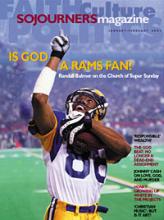Not wanting to lose all credibility as a populist, I want to risk my credentials by criticizing for once not "the media elites" but "the people." Those elites may have some anti- or post-religious biases—not a few spend their lives attacking what they thought the faiths that shaped their childhoods were about—but they are also in business. They like to produce what will sell.
Listen to them for a while, and they will rightfully complain that "religious people" are not a sufficiently intense audience. Publishers get letters to the editor about religion stories only when the correspondents are aggrieved about treatment of their own. They produce valuable programs or print-media series on faith and get too few viewers and listeners, too few readers. Why emit signals if too few pick them up? Are religious people less curious about religion generically and other religions, faith, and spirituality in specific instances than they are about sports, fashion, the markets, secular news?
Poetry magazine used to banner Walt Whitman's line to the effect that "to have great poets you have to have great audiences." To have great religion coverage you have to have great response groups.
How to improve it? Clerical and lay leaders in all the faith communities have to help develop them. I've seen Sunday worship bulletins that notify members that a Baptist or Lutheran or Catholic Hour is on a local station at 5:30 a.m. Sunday; watch it, listen to it. But there's no mention of, say, a Bill Moyers TV series that poses the great issues. There may be a dismissal of a film that has a blasphemous intent—there are such, and they merit dismissal—but do synagogue and church groups gather to study the themes of the many good films that treat religion in complex and ambiguous ways?
Any efforts to quicken, arouse, educate, and inspire audiences and readers will pay off, and the elites will find new reason to pay attention to "religious people."
Read the Full Article

